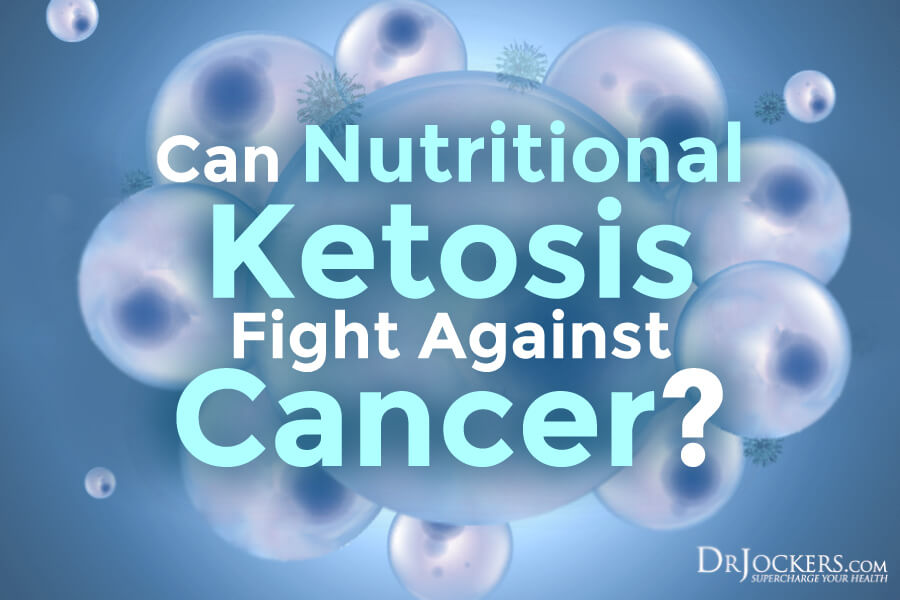 Can Nutritional Ketosis Help Fight Against Cancer?
Can Nutritional Ketosis Help Fight Against Cancer?
Nutritional ketosis has strong promise for helping individuals with cancer. Around 1,600 people die every day from cancer. As rates of cancer continue to rise, it is important to consider supportive and preventive strategies for fighting cancer. One of the most promising strategies is being in a physiological state of nutritional ketosis.
Nutritional ketosis is a metabolic state where your body burns ketones rather than glucose for energy. Fasting and a ketogenic diet are two ways to shift your body into nutritional ketosis and promote metabolic flexibility.
By lowering glucose and increasing ketone levels, you starve cancer cells while strengthening normal cells. This article discusses how to implement this powerful tool in the fight against cancer.
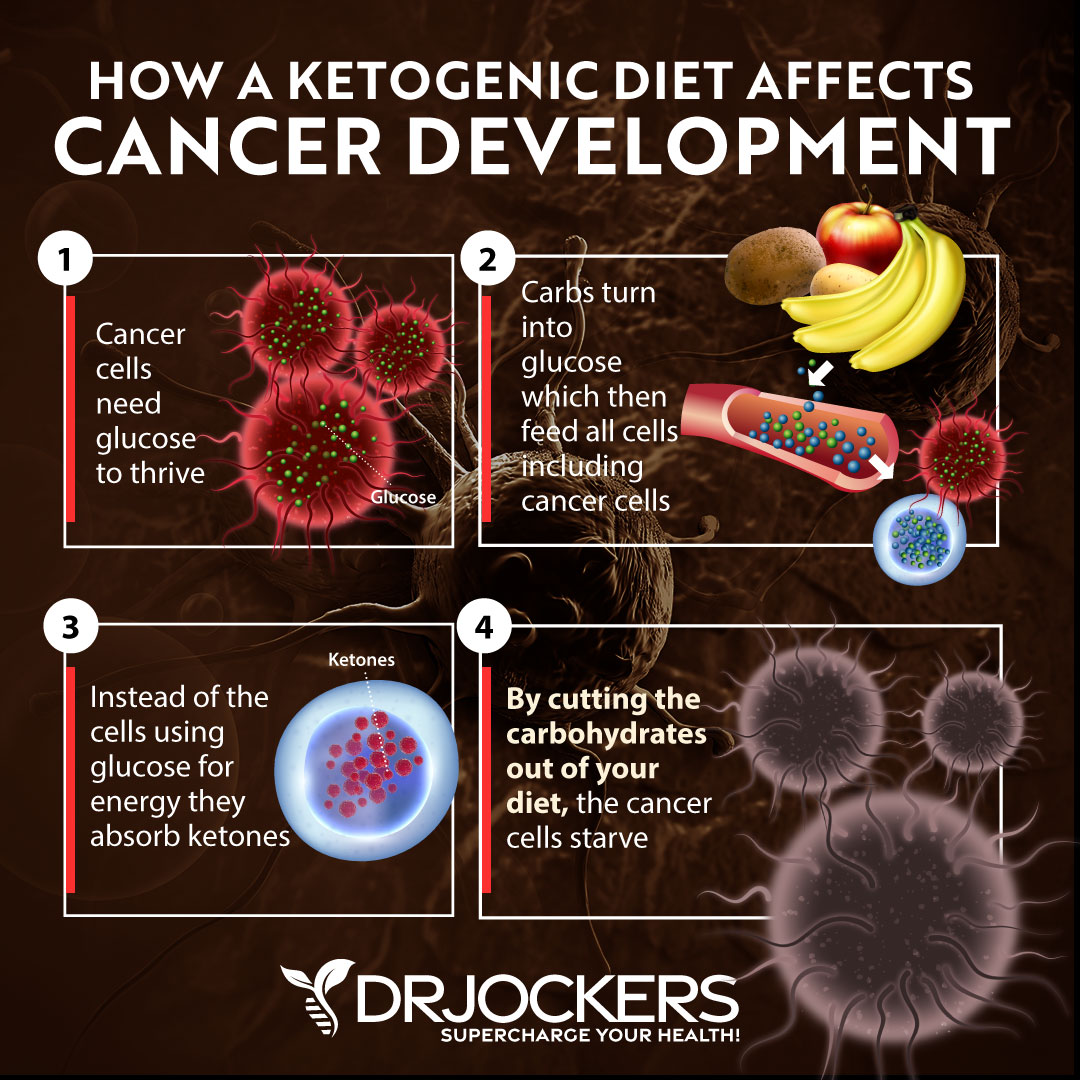
Nutritional Ketosis and the Ketogenic Diet
The ketogenic diet is a nutrition and lifestyle plan that helps your body to enter a state of ketosis. When your body is in nutritional ketosis, it utilizes ketones rather than glucose for fuel. Ketones are a preferred source of fuel, producing significantly more energy than glucose with less metabolic waste. Your body becomes metabolically flexible and is able to function at a more efficient level.
You can achieve nutritional ketosis through a ketogenic diet and by fasting. A ketogenic diet is high in healthy fats, low in carbohydrates, and low to moderate in protein. The approximate ratios of macronutrients on a ketogenic diet are:
- Healthy Fats: 70-80% of calories
- Protein:20-25% of calories
- Carbohydrates: 5-10% of calories
Transitioning from a sugar burner to a fat burner with a ketogenic diet can have amazing health benefits. The ketogenic diet lowers inflammation, reduces free radical production, stabilizes blood sugar levels, reduces insulin levels, and has many other positive health effects. It even reduces the risk of chronic disease and extends lifespan (1). To learn more about the benefits of ketosis and how to achieve it, check out this article.
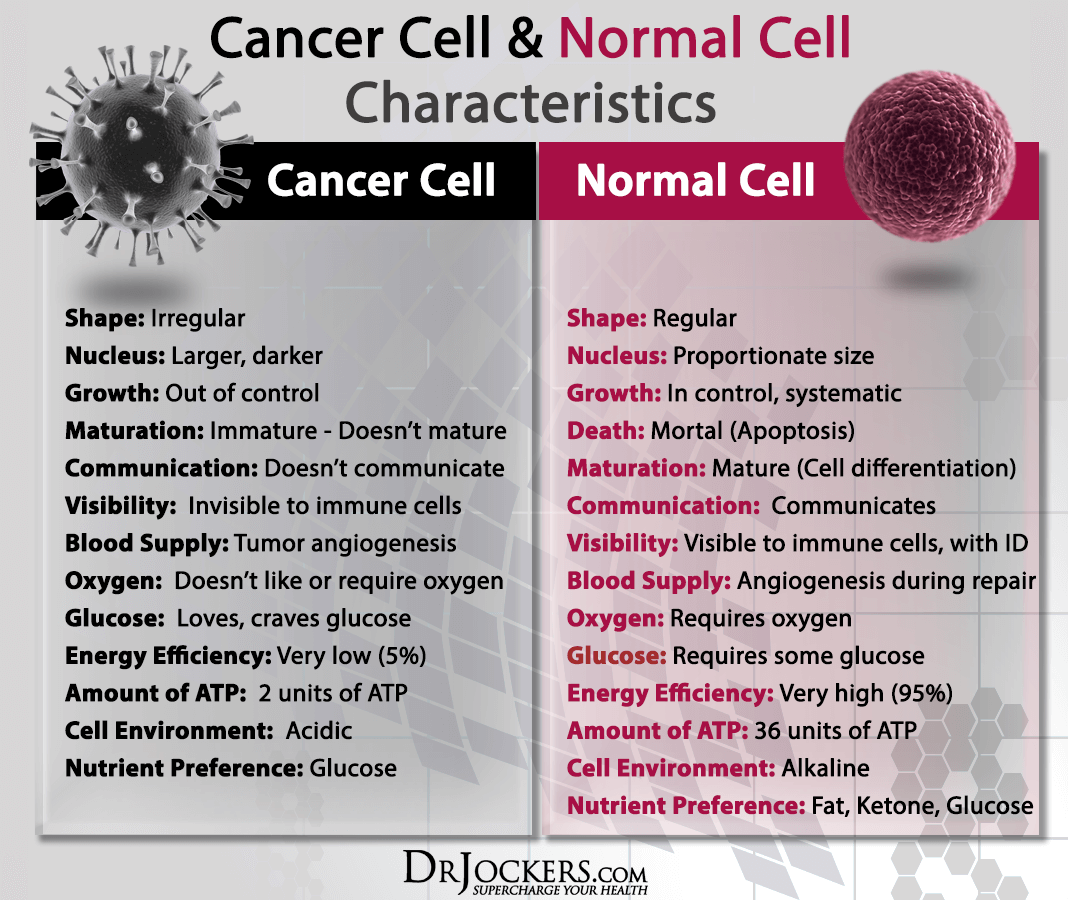
Nutritional Ketosis and The Metabolic Theory of Cancer
To understand how ketosis can help fight cancer, it is important to understand the metabolic theory of cancer. This theory was first espoused by German researcher, Dr. Otto Warburg around 100 years ago. Dr. Warburg and his colleagues discovered that cancer cells differ from normal cells in that cancer cells have abnormal or damaged mitochondria (2). Mitochondria are rod-shaped organelles that are the power generators of the cell, converting oxygen and nutrients into adenosine triphosphate (ATP).
In studying cancer cells, Dr. Warburg noticed that the mitochondria of cancer cells differ from normal cells in how they function. Normal cells use their mitochondria to burn oxygen and glucose together for energy. However, cancer cells are fermenters.
Cancer cells ferment lactic acid from glucose as a substrate even in the presence of oxygen. Warburg’s observation that cancer cells ferment glucose to lactic acid using glycolysis even in the presence of oxygen is called the “Warburg effect”.
Dr. Warburg was ridiculed for his view of cancer, but now his theory is being proven with greater understanding of the mitochondria and epigenetics. Modern pioneers in the field of cancer research, including Dr. Thomas Seyfried, view cancer as a disease in which damaged mitochondria prefer glucose and glutamine for fuel.
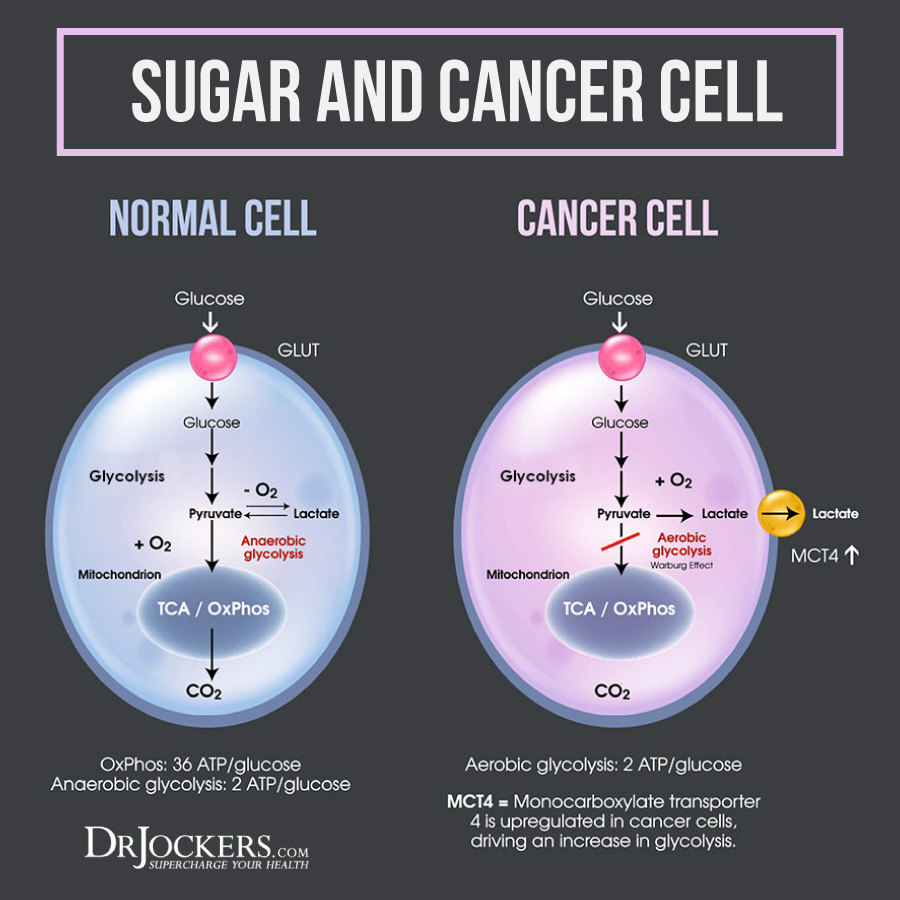
Defective Respiration of Cancer Cells
Dr. Warburg proposed that cancer cells have defective respiration. Researchers disagreed with Warburg because it appeared that cancer cells have normal respiration (oxidative phosphorylation). Dr. Thomas Seyfried and his colleagues have expanded Warburg’s research to fill in the “missing link” in Warburg’s theory (3).
According to their latest research, cancer cells do not have normal respiration. Rather, cancer is caused by damage to the respiratory function of the mitochondria with a compensatory fermentation. Cancer cells ferment glucose and glutamine with lactic and succinic acids as the byproducts. The fermentation is run by oncogenes which facilitate allowing glucose and glutamine to replace oxidative phosphorylation. Cancer cells have damaged respiration and must ferment to survive.
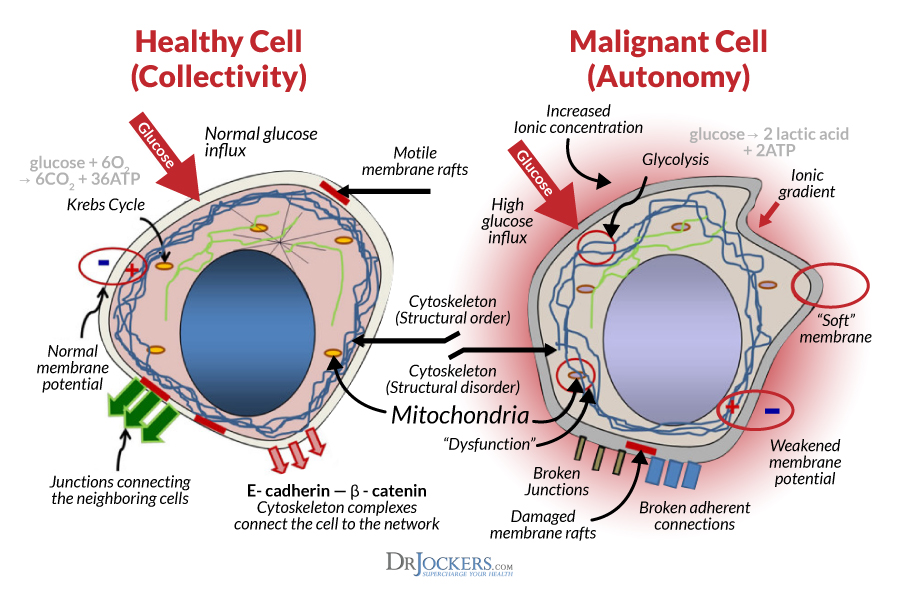
How Nutritional Ketosis Fights Cancer
Ketosis is an effective therapeutic strategy for cancer for many reasons. To survive and proliferate, most cancer cells require an abnormally higher amount of glucose than normal cells. They also have more insulin receptors than normal cells. The increased amount of insulin receptors gives cancer cells the ability to rapidly absorb glucose.
Being in ketosis deprives cancer cells of glucose while strengthening normal cells which can use ketones for energy (4). This is because most tumor cells lack the metabolic flexibility to use ketones as an effective energy source (2).
Elevating ketones with a ketogenic diet protects normal cells while placing metabolic stress on cancer cells. This inhibits cancer cell glycolysis and proliferation (5).
Additional anti-cancer effects of ketosis include:
- Increasing cancer cell oxidative stress
- Being anti-angiogenic
- Lowering insulin levels
- Reducing inflammation
- Promoting apoptosis (programmed cell death)
- Acting as an inhibitor of histone deacetylases (which reduces the ability of cancer cells to proliferate) (6,7).
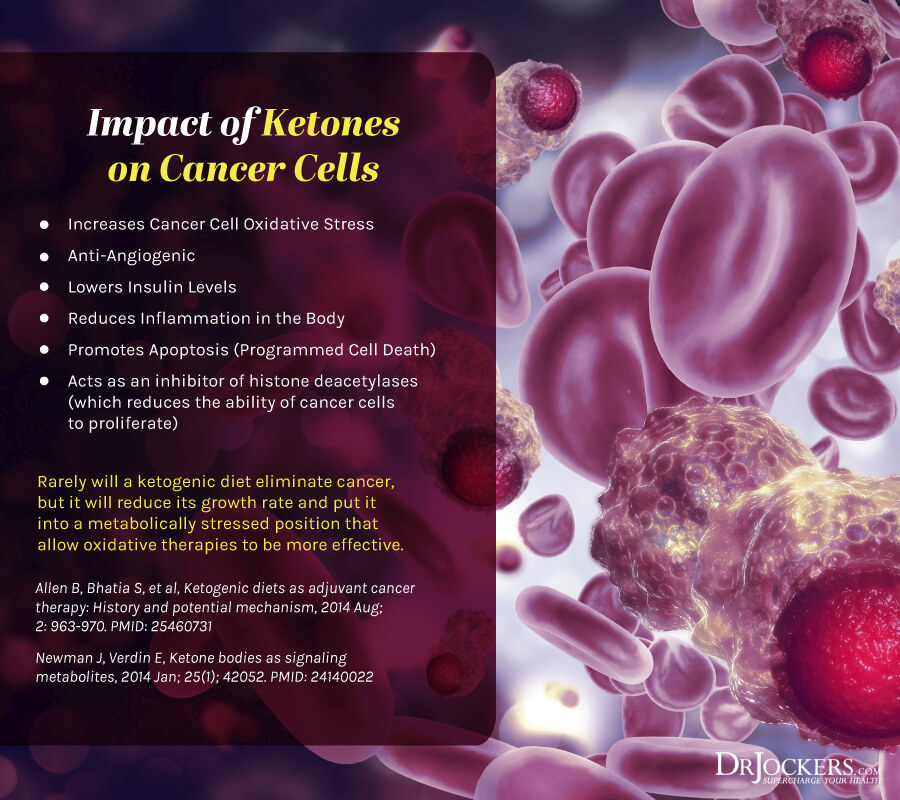
Nutritional Ketosis and Cancer
A 2017 study explained the correlation between the strength of the Warburg effect and tumor aggressiveness (8). The study used yeast as a model organism because yeast have the same ‘Ras’ proteins commonly found in tumor cells, which can cause cancer in mutated form. The study revealed how the hyperactive sugar consumption of cancerous cells leads to a vicious cycle of continued stimulation of cancer development and growth.
Recent studies on glioblastoma show the power of ketosis in the fight against cancer. Glioblastoma (GBM) is the most aggressive cancer that begins in the brain. Emerging evidence indicates that ketogenic metabolic therapy (KMT) can reduce glucose availability that drives GBM growth. KMT also elevates ketone bodies that are neuroprotective and non-fermentable (9).
Being in ketosis can also improve the body’s response to other therapies like hyperbaric oxygen, ozone, and even conventional cancer treatments. It keeps healthy cells healthy, inhibits cellular proliferations, increases apoptosis while enhancing the benefits of therapies.
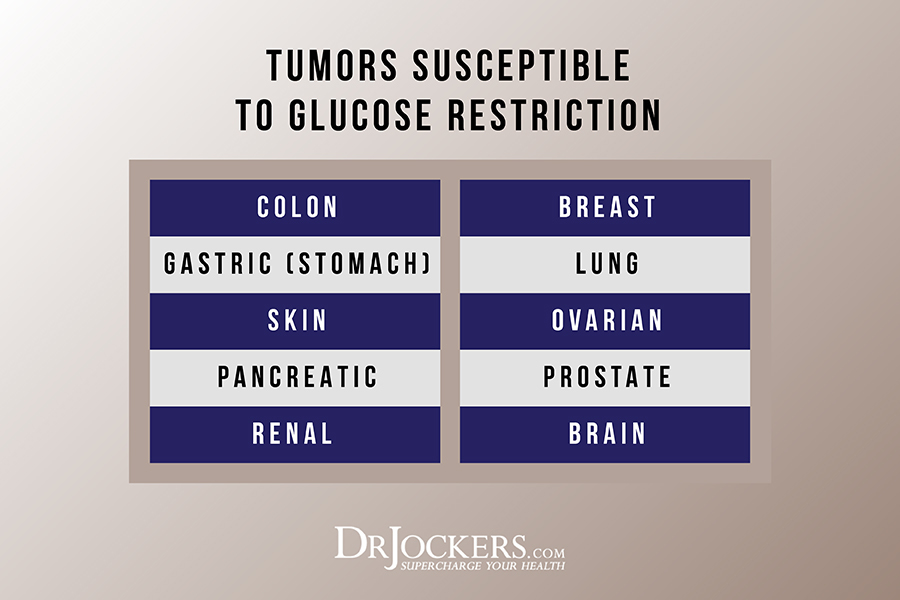
Key Cancer Mechanisms Affected by Nutritional Ketosis
There are many pathways in the body for cancer development. Four key pathways are AMPK, IGF-1, mTOR, and the P53 gene. Being in a state of nutritional ketosis can impact these mechanisms.
1. AMPK
AMPK (Adenosine Monophosphate-activated Protein Kinase) is an energy regulating molecule that signals ATP production. Studies show that AMPK is involved in cancer cell growth and survival (10). AMPK activity is decreased in cancer.
Restricting carbohydrates with a ketogenic diet can activate the AMPK pathway and help the body fight cancer. Upregulation of the AMPK pathway deprives cancer cells of glucose which inhibits cell proliferation and tumor growth.
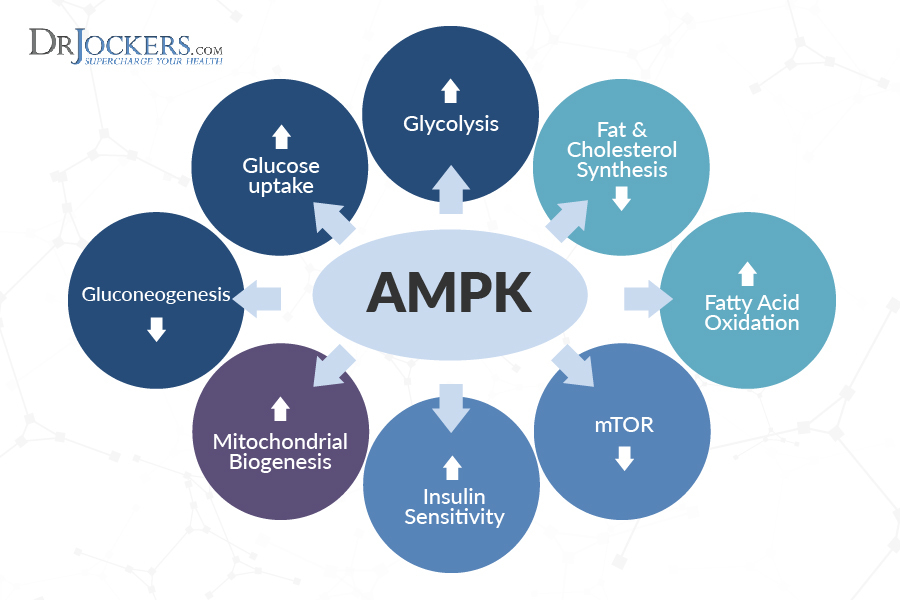
2. IGF-1
IGF-1 (insulin-like growth factor) is a growth stimulating hormone that regulates the reproduction and regeneration of cells. It is normal for children in the rapid developmental stages of life to have high levels of IGF-1.
However, elevated IGF-1 can be a catalyst for cancer growth for those not in a rapid developmental stage of life. Protein restriction, fasting, exercise, curcumin, resveratrol, and many other plant-based compounds can inhibit the production of excess IGF-1.
3. mTOR
mTOR (mammalian target of rapamycin) is a physiological pathway that regulates cell growth and replication. mTOR is necessary for a healthy body. However, the activity of mTOR is frequently upregulated in cancer (11). This can contribute to the rapid cell division found in cancer.
Insulin is one of the primary activators of the mTOR pathway. A high sugar and refined carbohydrate diet leads to high levels of insulin which, in turn, may fuel cancer growth by elevating mTOR activity. Excessive protein consumption can also stimulate this pathway. A plant-based ketogenic diet with limited amounts of protein as discussed below may be an effective strategy to prevent these pathways from contributing to cancer growth.
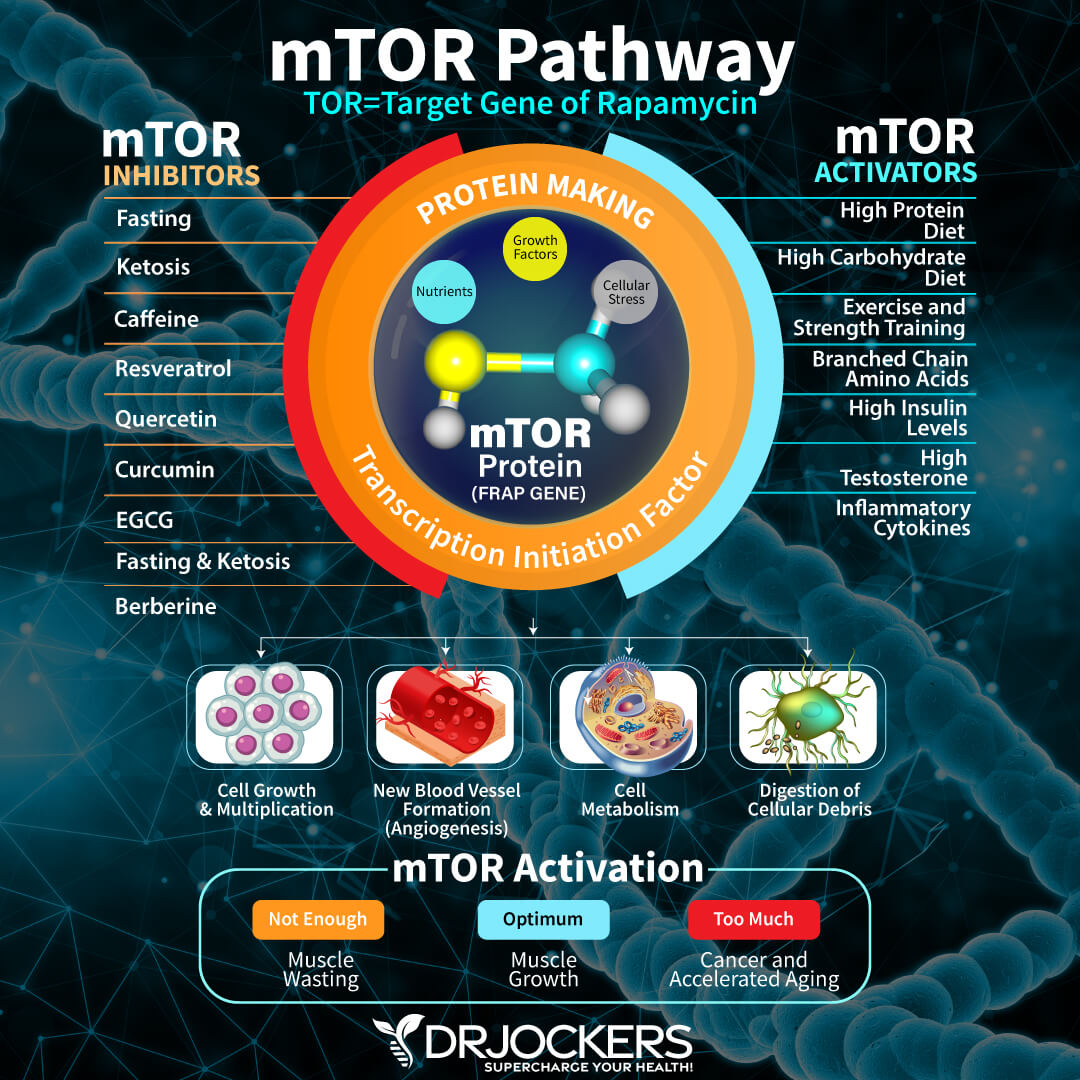
4. The p53 Gene
The p53 gene regulates what happens to damaged DNA sequences before they lead to problems in cell development. When functioning properly, the p53 gene responds in two ways to disorderly cells. If the defective DNA can be repaired, the p53 gene allows the cell to go back into its normal cycle of growth and reproduction. If the defective DNA cannot be repaired, the p53 signals for cellular apoptosis (programmed cell death), halting the potential for cancerous growth.
The p53 gene and its family of proteins are also important in regulation of metabolism and can help suppress glucose uptake (10). This critical gene is frequently mutated in cancers. A high sugar diet and certain nutritional deficiencies, such as zinc deficiency, contribute to the inactivity or mutation of the p53 gene. There are numerous plant-based compounds that can help restore proper p53 function.
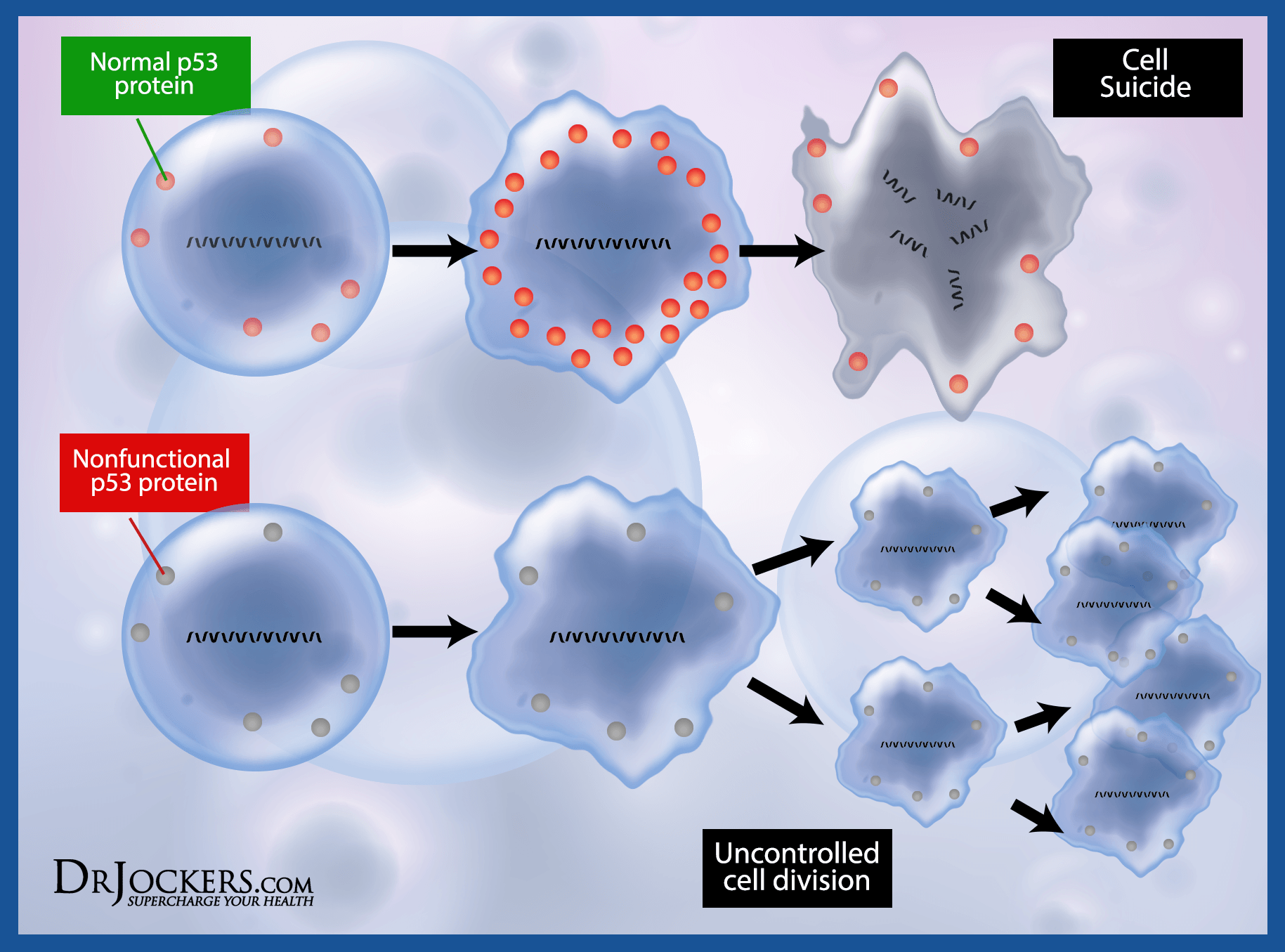
The Role of Glutamine and the Press-Pulse Strategy
Glutamine is an incredible amino acid that plays a vital role in many bodily functions including gut function and immune function, and many other functions in the body. This important amino acid has a role in the metabolism of certain cancers. Some cancers are fueled by glutamine in addition to glucose.
With glucose and glutamine being the prime fuels for driving the dysregulated growth of cancer, Dr. Seyfried and his colleagues have developed a “press-pulse” therapeutic strategy for managing cancer. This mechanism may reduce or eradicate tumor cells with minimal patient toxicity.
The press is chronically stressing tumor cells by depleting their glucose with a restricted ketogenic diet or therapeutic fasting. Getting into a deep state of nutritional ketosis with non-fermentable ketone bodies protects normal cells from energy stress while elevating energy stress in tumor cells. This is because tumor cells lack the metabolic flexibility to use ketones for fuel. This may kill some cancer cells.
There is no diet system to target glutamine, but there are certain drugs that target glutamine. The cutting-edge research is now exploring the dosage, timing, and scheduling of drugs to target glutamine without harming our normal cells. With glutamine being such an important amino acid, the mechanism to target glutamine without inhibiting these other functions is the current challenge.
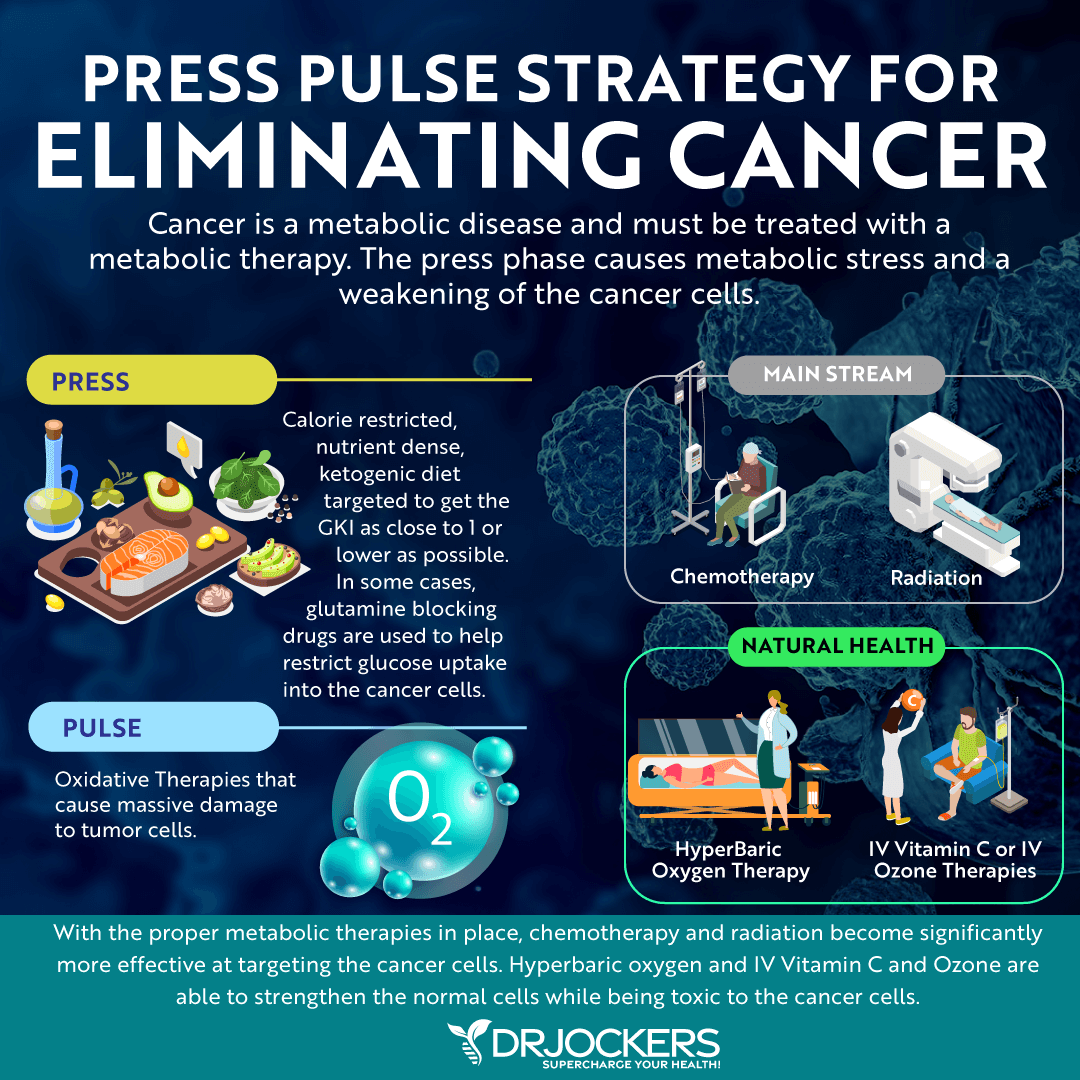
Does Glutamine Supplementation Cause Cancer?
Glutamine is a critical amino acid that plays an extremely important role in the body’s immune response. It is the most abundant amino acid in the body and cancer cells primary way of getting access to glutamine is by invading surrounding tissue and getting the glutamine that is in circulation.
Glutamine is the preferred fuel source of the cells of the intestinal lining and helps support a healthy gut junction and gut immune response by increasing sIgA levels (12, 13, 14). In addition, it helps to reduce food sensitivities, reduces inflammation and autoimmune conditions and supports circulation and lymphatic detoxification (15).
Studies have even shown that it helps to improve the ability to recover from various cancer treatments by reducing muscle loss and improving gut and immune barrier function (16). Read this article for all the many important functions that glutamine provides and the scientific research that supports its use.
There is currently no research that supplemental glutamine increases one’s risk for developing cancer. However, as a clinician, I typically do not recommend supplemental glutamine for cancer patients to be on the safe side. I do, however, use it all the time with individuals with digestive problems, autoimmune and chronic inflammatory conditions and with athletes to improve recovery.
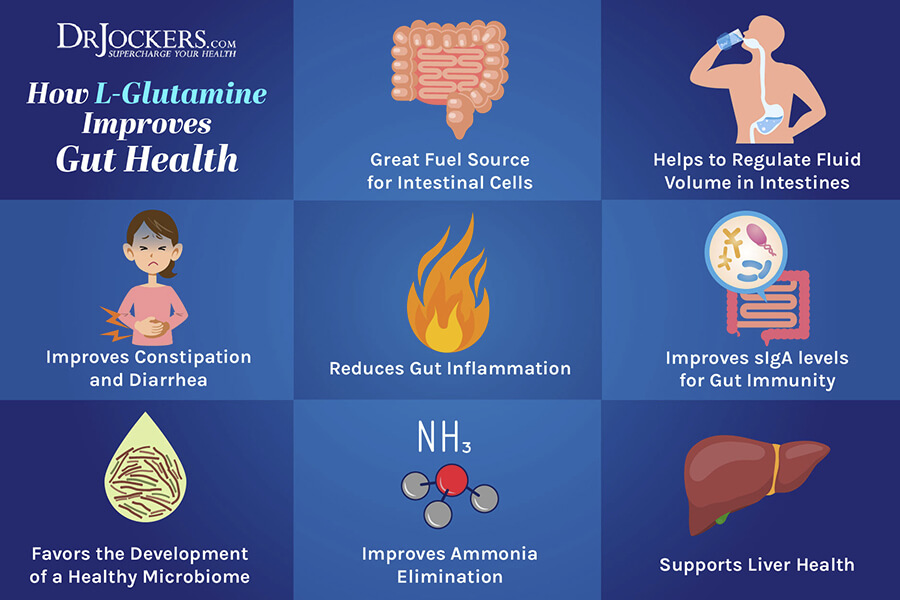
Epigenetic Influences in Cancer Development
It is important to recognize the epigenetic influences of cancer. Cancer is generally a result of faulty DNA leading to poorly functioning cells (genetics). The majority of cancer researchers contend that cancer is a genetic disease rather than a metabolic disease. They propose that these DNA mutations are completely random and conditions like cancer simply “run in the family”.
We now know that there are several epigenetic pathways in the body that are associated with cancer growth. Epigenetic influences, such as diet, lifestyle, and environmental factors, can largely dictate whether these faulty DNA sequences will occur or not. Being in ketosis can alter the epigenetic pathways to improve your chances of overcoming cancer.
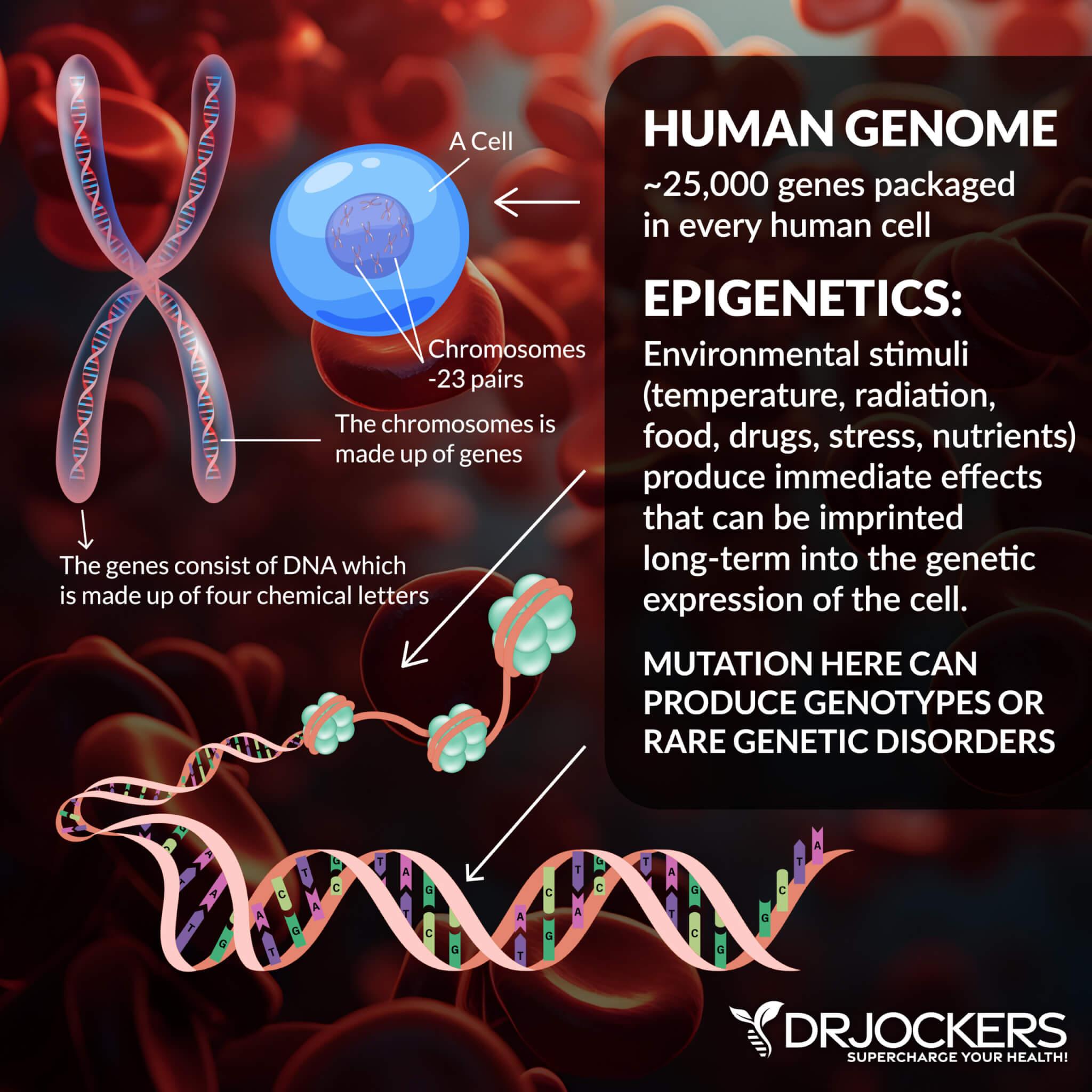
How to Implement a Plant-Based Diet Ketogenic Diet
The best nutrition plan to combat cancer combines a plant-based diet with the ketogenic diet. A plant-based diet can be potent to fight cancer because numerous plant compounds have been shown to act on different pathways in the body to downregulate cancer growth.
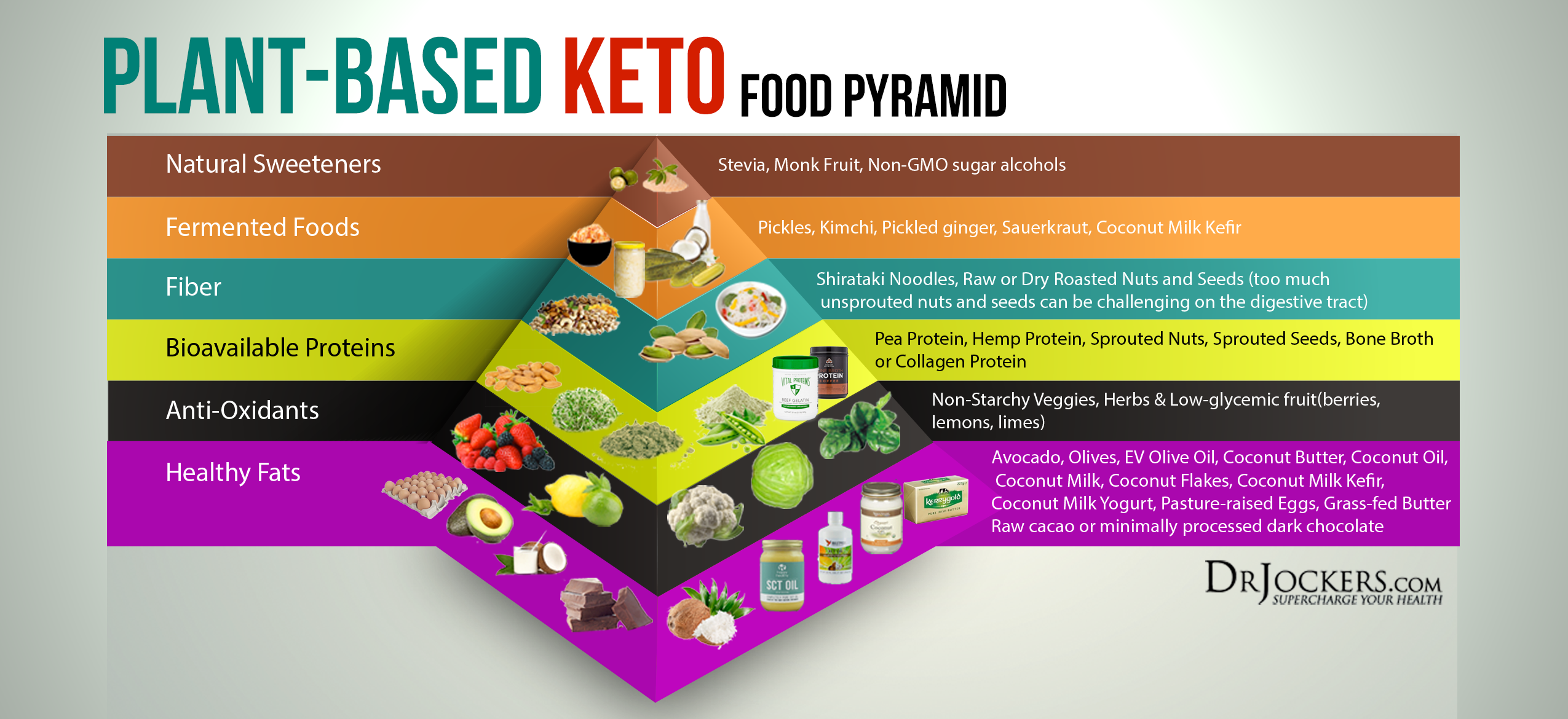
Healthy Fats
Around 80% of your calories should come from healthy fats. Healthy fats are found in grass-fed butter and ghee, coconuts, coconut butter and oil, MCT oil, pastured eggs, olive oil, olives, avocados, and avocado oil. High fat nuts like macadamia nuts are also included.
Low Glycemic Vegetables and Fruits
A variety of lower-carbohydrate, low-glycemic, colorful vegetables and fruits should be included for their abundant antioxidants and phytonutrients. Vegetables include broccoli, cauliflower, Brussels sprouts, cabbage, celery, cucumbers, green beans, okra, zucchini, and leafy greens like kale, collard greens, Swiss chard and spinach.
Allium vegetables such as garlic and onions contain powerful antioxidants and cancer-fighting properties. Sprouts, especially broccoli sprouts, are also great to incorporate into an anti-cancer nutrition plan.
Low-glycemic fruits to include are olives, lemons and limes, avocados, and coconuts. You can use very small amounts of berries such as raspberries, blackberries, blueberries and strawberries. Herbs and spices like turmeric, cinnamon, rosemary, oregano, basil, cilantro, sage, and thyme have healing properties and should also be included.
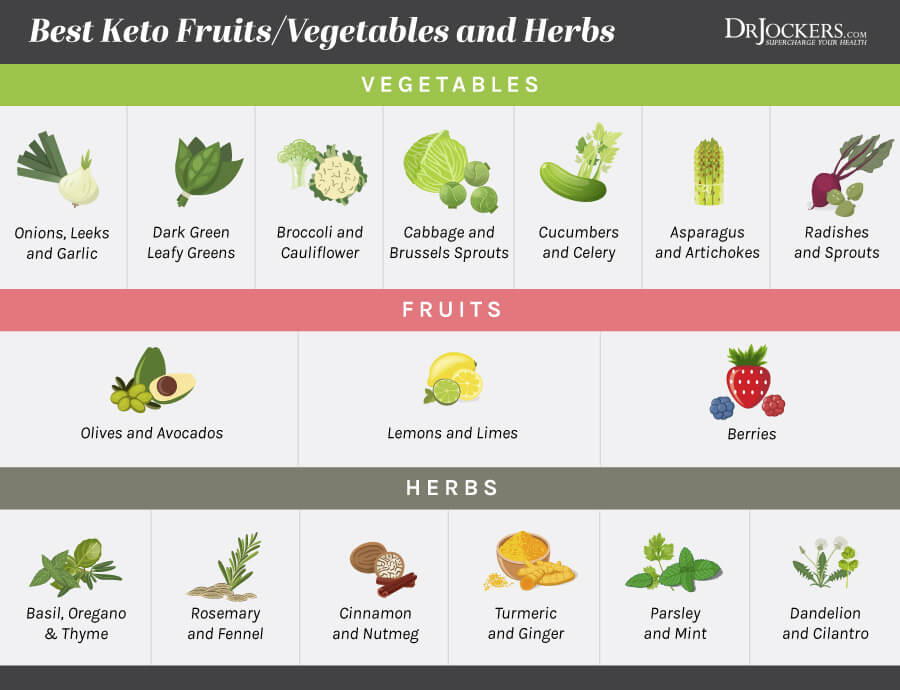
Protein
Daily protein consumption on an anticancer nutrition plan should be lower than for a healthy, active individual. A higher amount of protein can overstimulate the mTOR pathway and IGF-1 which are often hyperactive and stimulate out of control cell reproduction processes.
Eating too much protein can also stimulate gluconeogenesis. Gluconeogenesis is a metabolic pathway by which the body converts non-carbohydrate sources (like amino acids) into glucose. Gluconeogenesis will raise blood sugar and take you out of nutritional ketosis.
To reduce the mTOR pathway and IGF-1 expression, it is important to consume around 0.5-1.0 g of protein per kilogram of body weight. For example, a 160-pound person would consume only about 36 grams of protein per day.
Divide weight by 2.2 lb/kg to calculate body weight in kilograms,
Half of your body weight in kilograms is daily protein requirement:
160 lbs / 2.2 kg = 73 kg body weight
.5g x 73 kg = 36.5 – 73 g of protein per day.
The best sources of protein are pastured, organic eggs and bone broth or collagen protein. You can also consume small amounts of grass-fed meats and wild-caught fish. When you are consuming a low amount of protein, it is important to hydrate throughout the day, increase fat intake, and increase overall vegetable content for increased fiber. This will help you stay full while consuming lower amounts of protein.
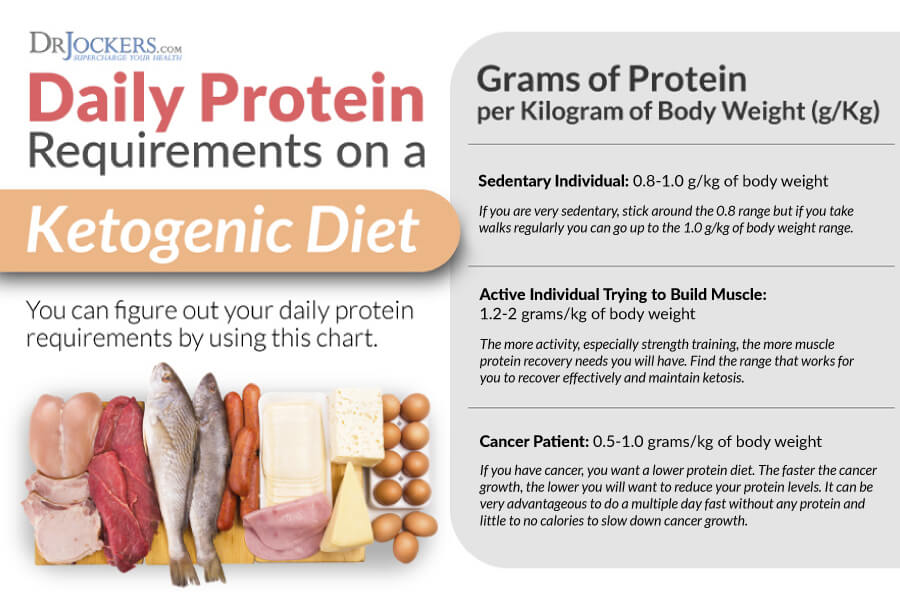
Fasting to Shift into Nutritional Ketosis
Fasting is a fantastic strategy to metabolically shift your body into ketosis. While fasting, your body uses ketones rather than sugar for energy. Fasting is cancer fighting because it helps to slow down mTOR and IGF-1 expression, improve AMP-K expression, stabilizes the p53 gene, and increases autophagy.
A great way to quickly get into ketosis is with a water fast. A water fast can help your reach an optimal GKI for fighting cancer. For guidelines on how to do a 5-day water fast and what to expect, read this article.
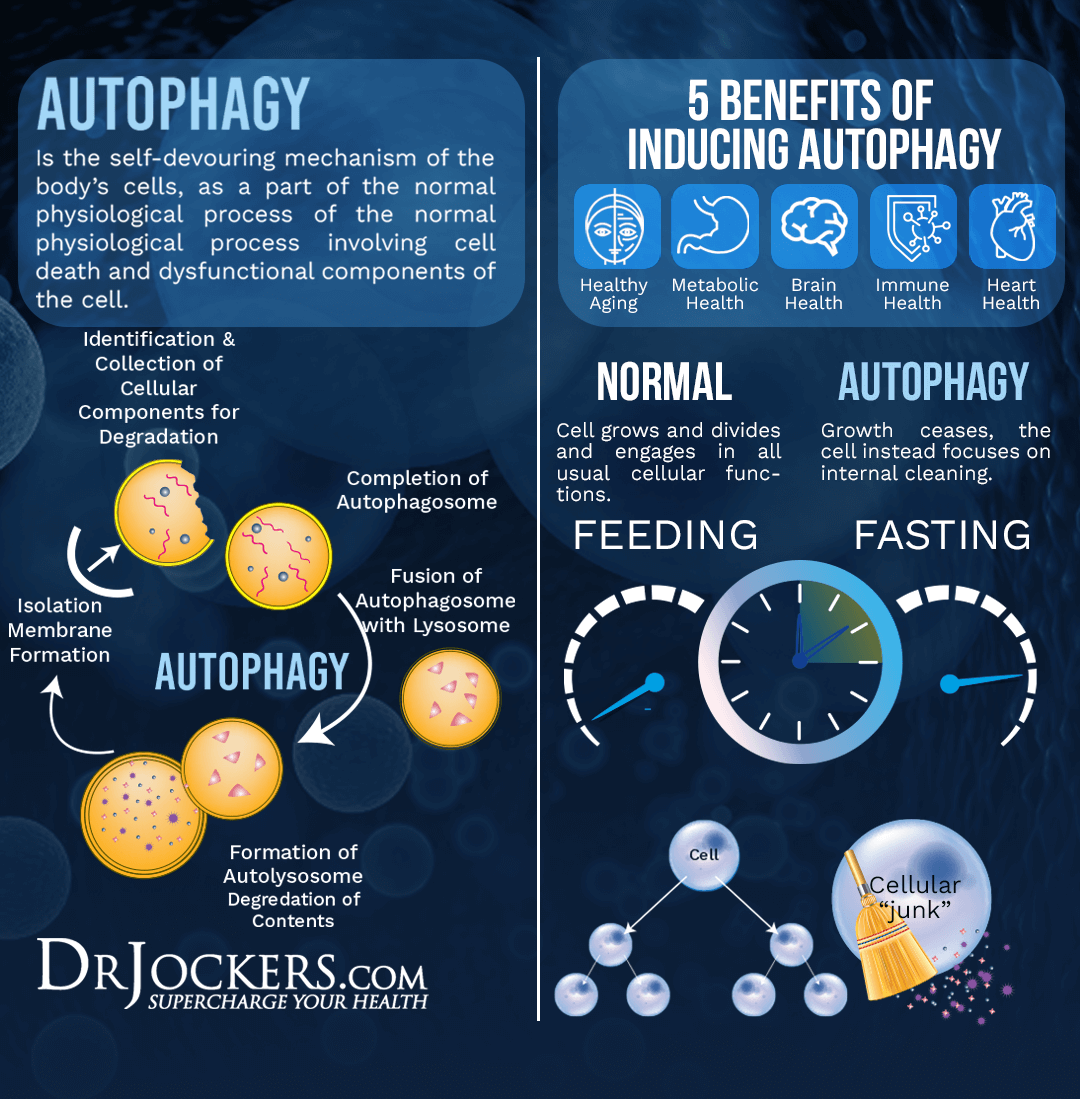
Glucose to Ketone Ratio
To monitor whether you have reached a therapeutic level of ketosis, researchers developed the Glucose Ketone Index (GKI). This index tracks the ratio between blood glucose and ketones at any time. It is used to measure how tumors respond to fasting and the ketogenic diet (17). If you aren’t sure how to test your blood glucose or ketones than read this article.
To calculate GKI, you divide blood glucose by 18. You then divide that number by the blood ketone level. For example, if your blood glucose is 64 and your ketone level is 3.1, your GKI would be 1.15.
GKI: (64/18) / 3.1 = 1.15.
Researchers have found that a ratio of 1:1 is most effective for shrinking tumors.
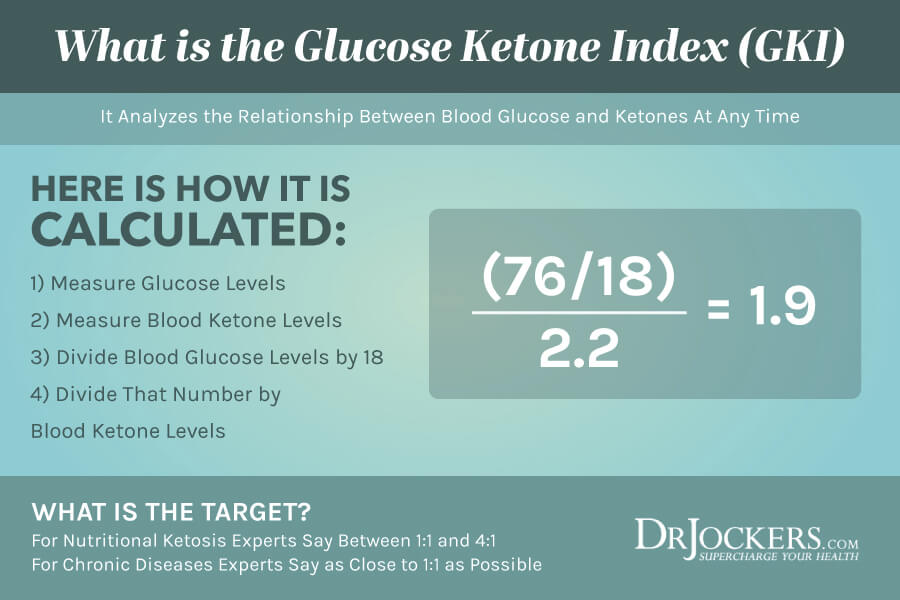
Critical Strategies for Optimizing Nutritional Ketosis
The following tips will help you while in ketosis or implementing a ketogenic diet:
1. Consume High-Quality, Organic Foods
When fighting cancer, it is critical to maximize nutrition and minimize toxins. To get the maximum benefits from a ketogenic diet, it is important to consume healthy fats, clean-source protein, and organic, antioxidant-rich vegetables and herbs.
You do not want to consume processed animal products or commercially raised meats. It is also critical to avoid processed vegetable oils that are high in polyunsaturated fatty acids. These foods are highly inflammatory and toxic to the body.
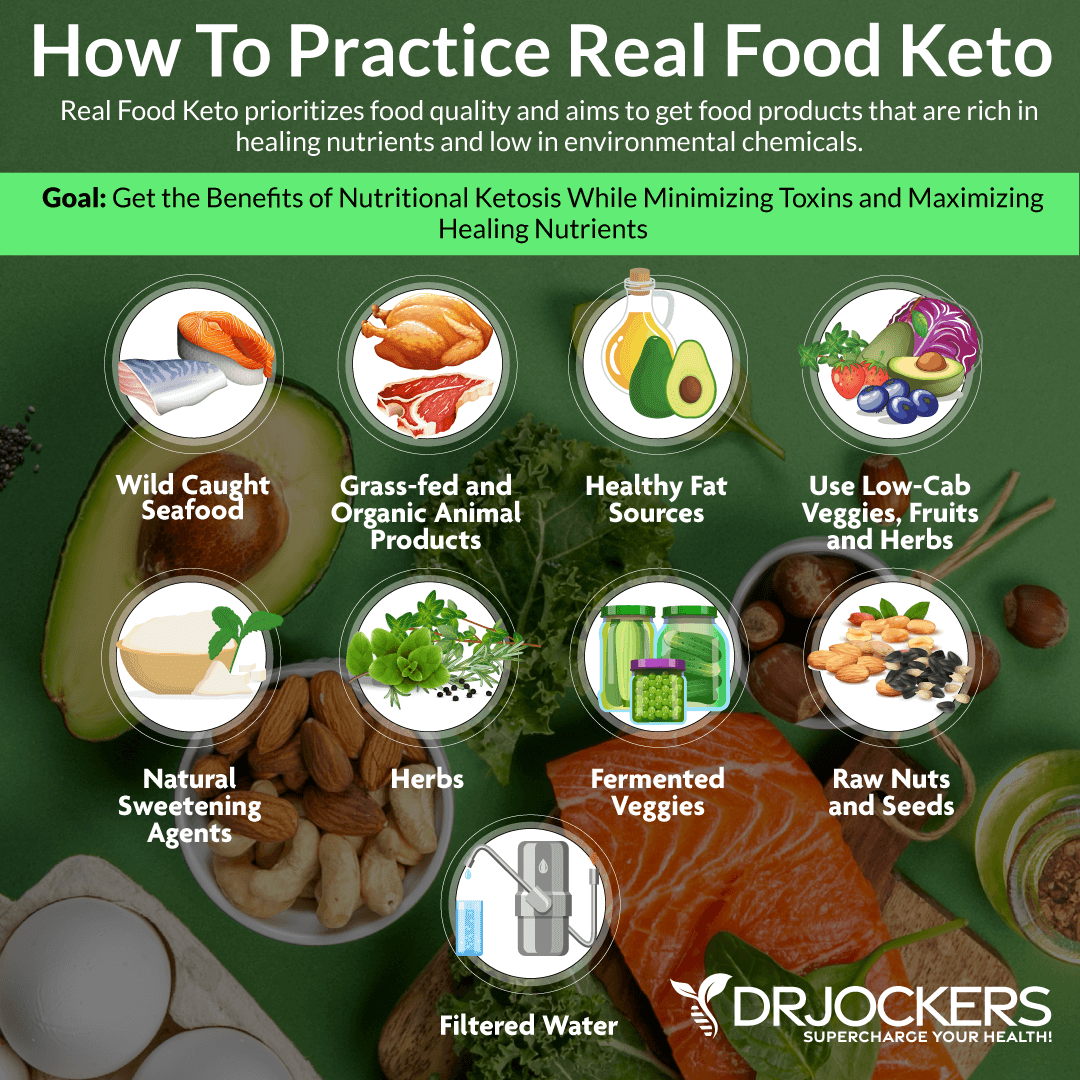
2. Super Hydration
While in nutritional ketosis, you should drink plenty of water to ensure proper hydration and to assist with gentle detoxification. For water, drink at least half of your body weight and up to your full body weight in ounces a day.
Filtering chlorine, fluoride, heavy metals, and pharmaceutical drugs from your water with a high-quality filter is critical. I recommend using a water purification system and drinking purified water instead of regular tap water and using glass or stainless-steel bottles instead of plastic. (Avoid bottled water or unfiltered tap water.). You may add some lemon juice, cucumber slices, basil, mint, other herbs, or berries for taste.
I recommend systems like Aquatrue or the Berkey system for low-cost filtration. The best water is the UltraLux Triple Action Hydrogen Water Machine which is what I use at home as it is powered by molecular hydrogen which reduces oxidative stress in the body and improves immune function.
Herbal teas are another option for hydration. They provide immune-stimulating superfood herbs that contain antioxidants and phytonutrients. In addition, staying hydrated will improve your energy and reduce feelings of hunger or cravings.

3. Replenish Minerals
It is important to consume high quality salt such as Himalayan pink salt while in ketosis. This is particularly important during the initial adaptation phase to the ketogenic diet when the body excretes excess sodium and minerals due to the drop in insulin levels.
The best way to replenish these minerals and avoid symptoms of the keto flu is to use a high-quality pink or gray salt and drink organic bone broth throughout the day. Celery, sea vegetables and cucumbers are also excellent to add to your diet because they are low carb and have natural sodium and trace minerals.
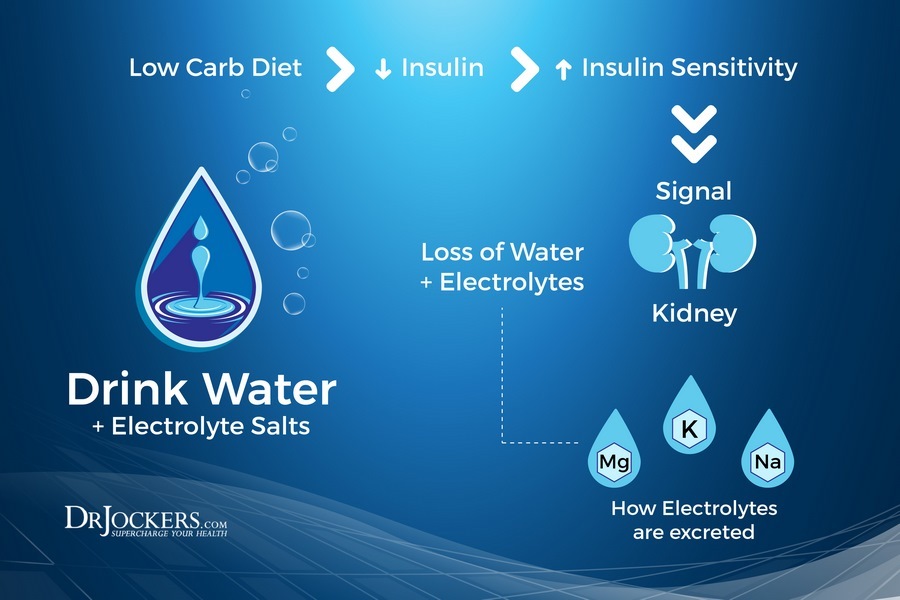
4. Exercise Regularly
High-intensity exercise in short bursts (surge training) increases AMP-K, promotes metabolic flexibility, and increases oxygenation of tissues. It is important to limit high-intensity interval training to 15-20 minutes, 2-4 times a week. Doing more can raise cortisol and pull you out of ketosis.
Regular, low-intensity exercise is also beneficial. Barefoot walking outdoors has the added benefit of contact with free electrons from the Earth. These electrons support your electromagnetic frequency, which calms your stress response and improves healing and wellbeing.
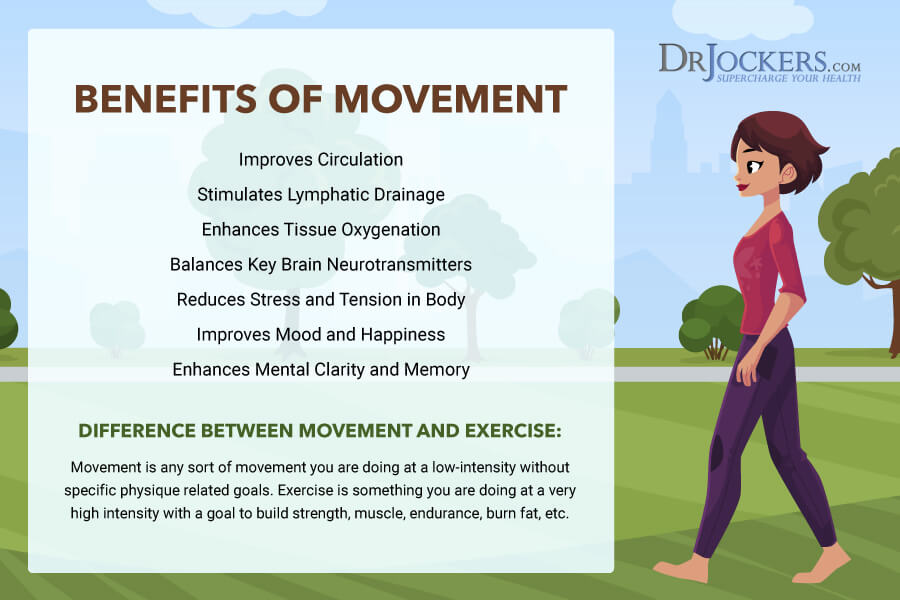
5. Improve Bowel Movements
Regular bowel movements are important because constipation can increase stress hormones and pull you out of ketosis. Many people experience constipation on a ketogenic diet, but there are many steps you can take to improve bowel movements.
Consuming plenty of fibrous vegetables, fermented foods, water, and minerals can aid the digestive system. Stress inhibits proper digestion so be sure to perform an act of gratitude or prayer before meals to put your body into a resting state.
A fantastic supplement for natural, gentle relief from constipation is Bowel Mover. This product is specifically designed to promote digestive and detoxification support without causing cramping or dependency.
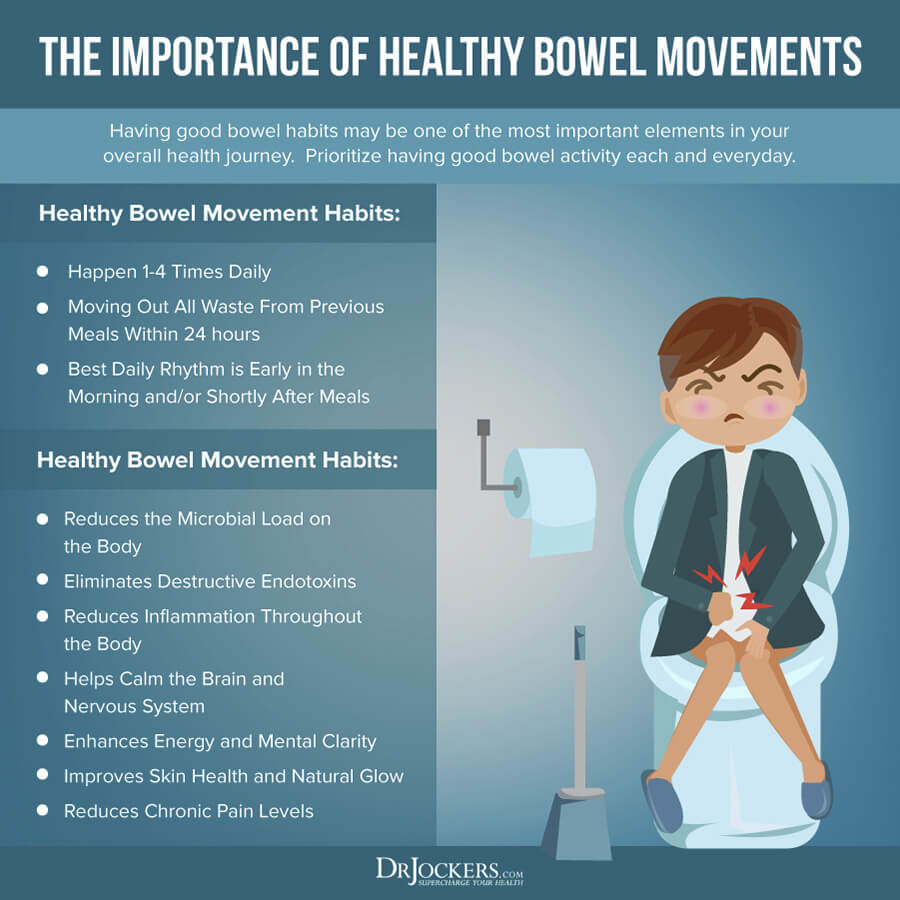
6. Use MCT Oil
Producing ketones can be a stressor on the body, especially if you have mitochondrial dysfunction. This stress can be relieved with MCT oil. MCT oil is easily converted into ketones to alleviate this stress and improve your state of ketosis.
C8 MCT oil (caprylic acid) is a superior MCT oil with pure and ketogenic C8 (caprylic and triglyceride) formulation. This turns immediately into ketones and is the easiest on the digestive system compared to MCT oils that contain a blend of C8 and C10 fats.
Supplementing with Betaine HCL, ox bile and digestive enzymes can also be helpful for proper digestion on a ketogenic diet. You can also find herbs and tonics such as apple cider vinegar, ginger, peppermint and others that support healthy digestion and the absorption of fats, protein, carbohydrates, and fiber.
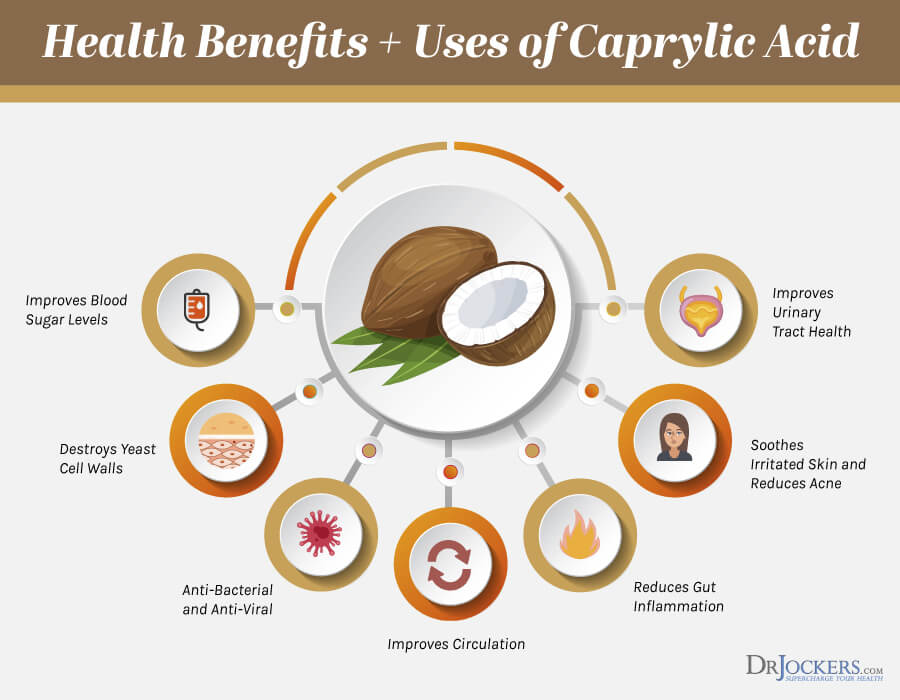
7. Less Stress, More Sleep
To maintain an optimal state of ketosis, it is important to minimize the stress in our lives and obtain optimal sleep. There are several strategies you can use to minimize stress. Prioritize the things that matter most to you and say no to the things that do not. Moderate exercise, stretching, prayer or meditation, journaling, practicing gratitude are additional ways to reduce stress.
Restorative sleep facilitates healing and counteracts stress. Sleep is vital for optimal functioning and sleep deficiencies are linked to a number of health issues.
For optimal sleep, It is important to: 1) be in bed no later than 11 p.m.; 2) blackout your room with blackout curtains or a sleep mask; 3) keep the temperature between 60-65 degrees; 4) get sunlight in the morning to prime the circadian rhythm; 5) avoid blue light exposure 4 hours before bed (with blue light blocking glasses or turn off the devices); and, 6) use caffeine early in the day in small quantities and cycle on and off caffeine.
An important micronutrient that plays a critical role in stress and sleep is magnesium. Magnesium helps to balance blood sugar and relieves physical tension, both of which are related to stress and impaired sleep. This article discusses additional ways magnesium relieves stress and anxiety.

Inflammation Crushing Ebundle
The Inflammation Crushing Ebundle is designed to help you improve your brain, liver, immune system and discover the healing strategies, foods and recipes to burn fat, reduce inflammation and thrive in life!
As a doctor of natural medicine, I have spent the past 20 years studying the best healing strategies and worked with hundreds of coaching clients, helping them overcome chronic health conditions and optimize their overall health.
In our Inflammation Crushing Ebundle, I have put together my very best strategies to reduce inflammation and optimize your healing potential. Take a look at what you will get inside these valuable guides below!


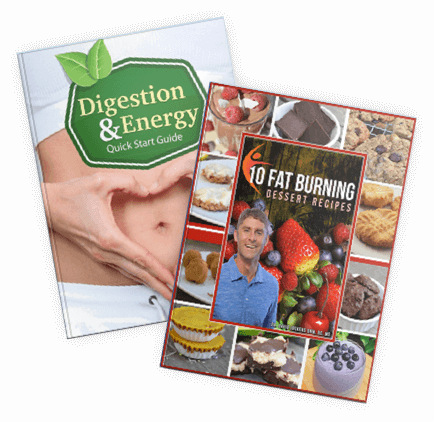

What probiotics would you recommend for one that has cancer, has already gone through six rounds of chemo and has been given, sadly, a very short window rest of life.
Thank you for this timely article and for your passion to educate and help us all have better health Dr. Jockers!
Amanda
Hey Amanda, I am very sorry to hear about this situation! This article offers more information on probiotics, protocols and recommendations. I would also strongly recommend that this person works with a functional health practitioner who will create a customized protocol for healing!
Thank you so much for your care and writing me back with that link. I really appreciate it! We purchased your Cancer Cleanse program as soon as we first learned of her cancer though it’s been challenging, to say the least, to have her change her diet. My husband and I are applying much of the recipes and info for ourselves however, so we thank you!
That is great to hear. I hope you are enjoying the recipes! Thank you for sharing Amanda!
Both my mother and my husband have cancer, mom at 81 has lung cancer , and husband has leukemia/lymphoma. Both have implemented a ketogenic diet as part of their multi-faceted strategy. Within just a few weeks my husband noticed such a positive change in his overall energy and his lymph node swelling reduced to such a point that his oncologist didn’t recognize him – doing a double take to check the name on the chart – at his next checkup. My mother is a different situation. Her immunotherapy drug created an adverse event which has landed her in the hospital nearly invalid. We continued to bring all her ketogenic meals, but she lost so much weight because the ketogenic foods were unappealing and hard to chew. We have switched to a more Paleo/Nourishing Traditions menu. I have searched and searched without finding a source for tasty soft or liquid Keto meals – preferably homemade.
Hey Lee, I am happy to hear that your husband is feeling great! For your mom I would recommend looking at some of the recipes in this article that feature keto drinks and beverages. This article also offers some additional recipes or ideas that may be easier to chew.
just purchased cancer cleanse. how do i access the i formation?
Hey Cindy, you should get an email with your specific link and password. We will have James from our IT support follow up with you. Blessings!
Hello it’s good to hear people are getting better after keto diet especially from cancer
Pls i need a health coach pls assist how to go through so that I get one from drjonkers
Yes, you can contact our team here: https://drjockers.lpages.co/long-distance-coaching-dr-jockers/